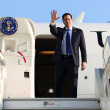Army chief Aviv Kohavi on Sunday said it was Israel’s “moral obligation” to prepare a military response against Iran’s nuclear program, hours after a senior Iranian official said his country has the ability to produce a weapon.
In light of growing uncertainty regarding a return by Iran to the 2015 nuclear deal due to long-stalled negotiations with world powers, the past year has seen the Israel Defense Forces ramp up its efforts to prepare a credible military threat against Tehran’s nuclear facilities.
In a speech at a ceremony marking the change of the military’s Home Front Command chief, Kohavi said, “Preparing the home front for war is a task that must be accelerated in the coming years, especially in light of the possibility that we will be required to act against the nuclear threat.”
“The IDF continues to prepare vigorously for an attack on Iran and must prepare for every development and every scenario,” he said.
Kohavi said “preparing a military option against the Iranian nuclear program is a moral obligation and a national security order,” adding that such preparation is “at the center” of the IDF’s preparations, and includes “a variety of operational plans, the allocation of many resources, the acquisition of appropriate weapons, intelligence and training.”
Last month, dozens of Israeli Air Force fighter jets conducted air maneuvers over the Mediterranean Sea, simulating striking Iranian nuclear facilities.
Iran is in the throes of negotiations to save a failing 2015 agreement it signed with world powers that was supposed to prevent it from producing a nuclear weapon. The so-called Joint Comprehensive Plan of Action offered Iran relief from sanctions in return for curbs on its nuclear program.
However, in 2018 the Trump administration pulled out of the pact — saying it did not go far enough to prevent Iran producing nuclear weapons and also due to its concerns over Iran missile development program. European-sponsored talks to bring the US back into the JCPOA have stalled for months and another recent round of negotiations between Iran and the US in Qatar also failed to make progress.
“Blocking Iran from obtaining a nuclear weapon with diplomacy is preferred, but history has proven many times that diplomacy can fail or succeed for only a short period of time, followed by violation or betrayal,” Kohavi said.
Kohavi said the military was preparing to strike Iran’s nuclear program for two reasons. “First, if there is no agreement and the Iranian nuclear program continues to expand, and the second, in case there is an agreement identical or similar to the previous deal, which means a bad deal, giving Iran the conditions to become a nuclear state shortly after its expiration date,” he said.
“The IDF readies military capabilities for the day when the political echelon will decide,” he added.
Earlier Sunday, Kamal Kharazi, the head of Iran’s Strategic Council on Foreign Relations, told Al Jazeera’s Arabic channel: “It is no secret that we have the technical capabilities to manufacture a nuclear bomb, but we have no decision to do so.”
“In a few days, we were able to enrich uranium up to 60 percent, and we can easily produce 90% enriched uranium,” he said.
On Thursday, US President Joe Biden and Prime Minister Yair Lapid publicly disagreed over how to stop Iran from attaining the bomb, with Lapid declaring that diplomacy would not stop the ayatollahs and Biden insisting it remained the best means. Nonetheless, the two also signed a joint strategic declaration, in which the US vowed to use “all elements in its national power” to prevent Iran from obtaining nuclear weapons.
In an interview with Channel 12 news which aired during his visit, Biden said that the US would use force against Iran “as a last resort” to prevent it from acquiring nuclear weapons.
Still, Israel, which opposes a US return to the JCPOA, has threatened to act alone in striking Iranian facilities if it feels there is an existential threat to the Jewish state from Iran equipping itself with nuclear weapons.
Maj. Gen. Rafi Milo replaced Maj. Gen. Uri Gordin during Sunday’s ceremony. Gordin will go on to command the IDF’s Northern Command.










